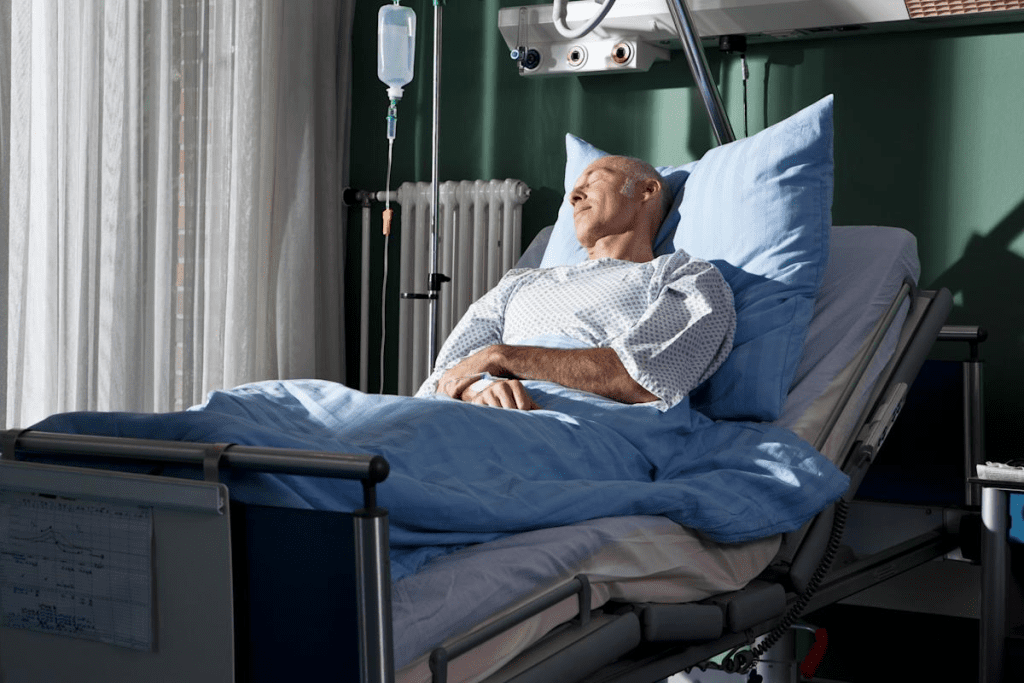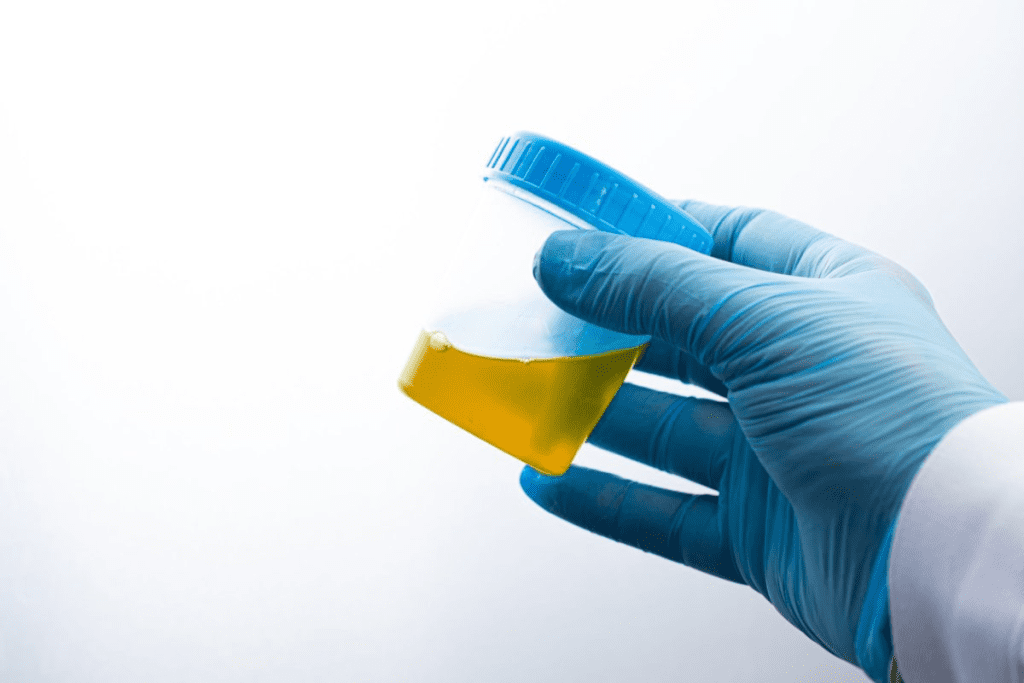Last Updated on October 31, 2025 by

Recovering from prostate surgery can be tough for many patients.Dealing with prostate removal surgery is a big worry. It affects both physical health and quality of life.
We focus on giving the best care and support at our institution. Patients usually stay in the hospital for one night. Then, they need several weeks to get better at home.
The journey to recovery after prostate surgery can be tough. But knowing what to expect can help a lot. We’ll guide you through the recovery stages and the challenges you might face.

There are mainly two prostatectomy procedures: robotic surgery and open surgery. Robotic surgery is less invasive and might lead to less blood loss and quicker recovery. Open surgery, with a bigger incision, often means a longer hospital stay and recovery.
Knowing the differences helps set realistic recovery expectations. The choice between robotic and open surgery depends on health, cancer stage, and the surgeon’s skill.
After prostate removal surgery, patients usually stay in the hospital for a night. Medical staff watch for complications and manage pain. Once home, patients learn to care for themselves, including managing pain and following catheter care.
The first days at home are key to a smooth recovery. It’s important to follow the surgeon’s instructions and contact the healthcare provider if there are any concerns.
Right after prostate surgery, patients may face pain and urinary catheter care challenges. These are usually temporary and manageable with the right help. Urinary incontinence is common at first but most men regain control within a year.
Being aware of these challenges helps prepare for recovery. With the right care and support, many men overcome these hurdles and live active, healthy lives.
Many men struggle to regain control over their urine after prostate surgery. This issue, known as urinary incontinence, can greatly impact their life after surgery. It’s a big worry for many, and we want to talk about how common it is, how long it takes to recover, and what affects this recovery.
Urinary incontinence is a common side effect of prostate surgery. Studies show that a lot of men deal with some level of incontinence after surgery. Most men regain full control of their urine within a year. But, how quickly this happens can vary a lot. This depends on the surgery type and the man’s health.

How fast men recover from urinary issues varies. Generally, most see big improvements in the first year. Early on, men often notice big changes in the first few months. Then, they keep getting better over time. By 12 months, most men have a lot of control back over their urine.
Several things can change how fast and well men recover from urinary issues. These include the type of prostate surgery they had, their age, health, and any urinary problems they had before surgery. Knowing these can help set realistic goals and improve recovery chances.
We’re here to support our patients every step of the way. We help them manage urinary incontinence and improve bladder control. By understanding what affects recovery, we can work together to make life better for our patients.
Sexual function after prostate surgery is a big worry for many. This surgery, though lifesaving, can affect a man’s quality of life. It’s important to talk about these issues with care and truth.
Erectile dysfunction (ED) is a common side effect of prostate surgery. Only about 34% of men regain erectile function within 12 months after surgery. This shows why it’s key to be aware and manage ED well.
New surgical methods, like NeuroSAFE, are helping men after prostate surgery. NeuroSAFE can almost double the chance of getting erectile function back. This gives hope to many patients.
How fast men recover from sexual issues varies. Age, how well they could get an erection before surgery, and the surgery type matter. Most see improvements in the first year, and some keep getting better after 12 months.
Men with ED after prostate surgery have many treatment choices. These include medicines, devices, lifestyle changes, and counseling. We help patients find the best treatment for them.
Understanding the long-term recovery process is key for patients after prostate surgery. It’s important to look at how recovery affects quality of life. We must consider many factors that impact a patient’s well-being.
Recovery from prostate surgery is a slow process. Important milestones are at 3, 6, and 12 months. At 3 months, patients start to feel better physically. By 6 months, symptoms lessen a lot. By 12 months, most men fully recover, unless complications arise.
Survival rates after surgery are a big concern for patients. Studies show a 5-year overall survival rate of 95.8%. The prostate cancer“specific survival rate is even better, at 99.7%. These numbers show how effective prostatectomy is for treating prostate cancer.
One major risk after surgery is biochemical recurrence. This happens when PSA levels rise after surgery. Up to 28% of patients may face this within 10 years. Knowing this risk helps manage expectations and plan for follow-up care.
While many men recover well, others face challenges. Patient stories offer insights into tough recoveries. These stories show the need for full support and care during recovery.
“I was prepared for the surgery, but not for the long recovery. It was tougher than I expected, but with the support of my care team, I got through it.”
A prostate cancer survivor
These testimonials highlight the importance of a holistic care approach. It’s not just about physical recovery but also emotional and psychological support.
Recovering from prostate surgery is complex. But, with the right care and support, patients can see big improvements in their quality. We’ve talked about the different parts of recovering from prostatectomy, like dealing with urine control and sex issues.
Challenges like not being able to control urine and sex problems are common after surgery. But most people see big improvements in the first year. Our team works hard to give each patient the care and support they need. We aim to help them get the best results after prostate surgery.
Knowing the ups and downs of prostate surgery helps patients make smart choices about their treatment. We focus on giving full care and support. This way, we ensure the best results for those going through prostate removal procedures.
Recovery time for prostate surgery varies. Most men take 3-6 months to fully recover. This time can change based on the surgery type and individual factors.
Regaining urinary control takes time. Most men get control back in 6-12 months. But some may face ongoing incontinence. Our team offers support and guidance to manage this.
Erectile dysfunction is common post-surgery. Its likelihood and severity depend on the surgery and individual factors. Modern techniques like NeuroSAFE have improved outcomes. Our team can discuss the risks and benefits with you.
There are many ways to treat erectile dysfunction post-surgery. Options include medications, lifestyle changes, and other interventions. Our team can help find the best option for you.
Managing incontinence post-surgery involves lifestyle changes and pelvic floor exercises. Our team can guide you on the best strategies for your needs.
Biochemical recurrence risk varies based on cancer stage and aggressiveness. Our team can discuss the risks and benefits of surgery. They also provide guidance on monitoring and follow-up care.
Getting hard after prostatectomy can be tough. But there are treatment options available. Our team can discuss the best options for you, including medications and lifestyle changes.
Robotic surgery has benefits like less blood loss and pain. It also leads to a faster recovery. But the best choice depends on individual factors. Our team can discuss the risks and benefits with you.
The first few days post-surgery involve discomfort, pain, and urinary catheter care. Our team will guide you on managing these issues for a smooth recovery.
Ko, Y. H., & Chung, D. Y. (2018). Functional recovery after radical prostatectomy for prostate cancer. Korean Journal of Urology, 59(12), 775-782. https://www.ncbi.nlm.nih.gov/pmc/articles/PMC6784702/Wennick, A., et al. (2017). Everyday life after a radical prostatectomy “ A qualitative study of experiences one year after surgery. European Journal of Oncology Nursing, 29, 20-25. https://www.sciencedirect.com/science/article/abs/pii/S1462388917300388
Subscribe to our e-newsletter to stay informed about the latest innovations in the world of health and exclusive offers!